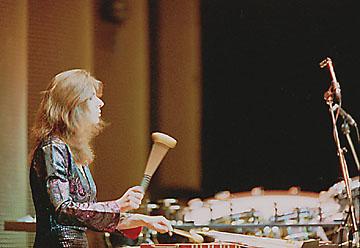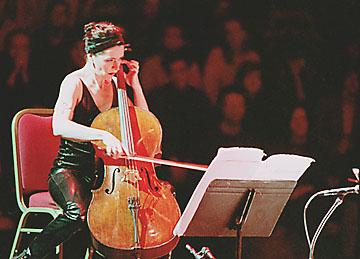The Winnipeg New Music Fest by Valorie Dick
/ April 1, 1998
 Winnipeg's seventh annual du Maurier
New Music Festival attracted a record attendance of 15,500 and more
than 250,000 radio listeners over a nine-day period in late January
1998, making it one of the largest events of its kind in the world.
But despite steady growth and outstanding public support, the
festival's future is in jeopardy. As a result of the Federal
government's new restrictions on advertising by tobacco companies,
du Maurier will probably withdraw its sponsorship amounting to
almost 20% of the Festival's $550,000 budget. In a sensational
incident reported by local papers during the Festival, Culture and
Heritage Minister Sheila Copps exchanged words with Festival
organizer Bramwell Tovey. Copps suggested that the Winnipeg Symphony
Orchestra (the Festival's organizer) use recent Canada Council
grants of $130,000 to replace du Maurier's largesse. Festival
supporters quickly pointed out that the Council's one-time grant is
a stop-gap measure that does nothing to assure the Festival's
long-term future. Winnipeg's seventh annual du Maurier
New Music Festival attracted a record attendance of 15,500 and more
than 250,000 radio listeners over a nine-day period in late January
1998, making it one of the largest events of its kind in the world.
But despite steady growth and outstanding public support, the
festival's future is in jeopardy. As a result of the Federal
government's new restrictions on advertising by tobacco companies,
du Maurier will probably withdraw its sponsorship amounting to
almost 20% of the Festival's $550,000 budget. In a sensational
incident reported by local papers during the Festival, Culture and
Heritage Minister Sheila Copps exchanged words with Festival
organizer Bramwell Tovey. Copps suggested that the Winnipeg Symphony
Orchestra (the Festival's organizer) use recent Canada Council
grants of $130,000 to replace du Maurier's largesse. Festival
supporters quickly pointed out that the Council's one-time grant is
a stop-gap measure that does nothing to assure the Festival's
long-term future.
The Winnipeg New Music Festival began in 1992 under the creative
direction of Winnipeg Symphony Orchestra Artistic Director Bramwell
Tovey and former WSO Composer in Residence Glenn Buhr. Despite being
held in January, one of the prairie winter's coldest months, the
first Festival attracted 10,000 Winnipeggers to the Centennial
Concert Hall. In its seven-year history, the Festival has welcomed
such renowned new music groups as the San Francisco-based Kronos
Quartet and England's Hilliard Ensemble. World-famous composers such
as Arvo Pärt and John Corigliano have visited the Festival to
explain their latest compositions.
This year's Distinguished Guest Composer was U.K.-born
Mark-Anthony Turnage, who is Composer in Association with the
English National Opera. Turnage presented six jazz-influenced,
visceral compositions including Three Screaming Popes
(inspired by Francis Bacon's painting); Kai, an
emotion-filled elegy to Turnage's late friend cellist Kai Scheffler;
and Twice through the Heart, a powerful commentary on spousal
abuse. Of course the Festival has always supported music composed and played by
Canadians. Guest composer Omar Daniel of Toronto was present for
performances of My Angel, an intimate vignette performed by
guitarist Rachel Gauk and soprano Monica Whicher. Daniel's
Bartokian-minimalist Double Concerto for violin and cello
(written for the Canada Council's 40th Anniversary) was premiered by
James Ehnes and Denis Brott on a violin and cello from the Council's
instrument bank. Other highlights included the Canadian premiere of
Joseph Schwantner's Percussion Concerto played by Scottish
percussion virtuoso Evelyn Glennie; Douglas Schmidt's Smokin' f
Holes interpreted by Canadian cellist Shauna Rolston and the
spirited Vancouver trio SqueezPlay; Hungarian György Kurtág's
intense Scenes from a Novel ably adapted and mounted by
Winnipeg soprano Therese Costes, members of the WSO, and four former
Royal Winnipeg Ballet dancers; and the Canadian premiere of John
Adam's Gnarly Buttons, a funky romp played by clarinettist
Lori Freedman. music composed and played by
Canadians. Guest composer Omar Daniel of Toronto was present for
performances of My Angel, an intimate vignette performed by
guitarist Rachel Gauk and soprano Monica Whicher. Daniel's
Bartokian-minimalist Double Concerto for violin and cello
(written for the Canada Council's 40th Anniversary) was premiered by
James Ehnes and Denis Brott on a violin and cello from the Council's
instrument bank. Other highlights included the Canadian premiere of
Joseph Schwantner's Percussion Concerto played by Scottish
percussion virtuoso Evelyn Glennie; Douglas Schmidt's Smokin' f
Holes interpreted by Canadian cellist Shauna Rolston and the
spirited Vancouver trio SqueezPlay; Hungarian György Kurtág's
intense Scenes from a Novel ably adapted and mounted by
Winnipeg soprano Therese Costes, members of the WSO, and four former
Royal Winnipeg Ballet dancers; and the Canadian premiere of John
Adam's Gnarly Buttons, a funky romp played by clarinettist
Lori Freedman.
The annual Canadian Composers' Competition featured finalists
Alastair Boyd, Chris Paul Harman, and Robert C. May. Harman, winner
of the 1990 CBC National Radio Competition for Young Composers, took
top prize ($4000 and a WSO commission) for his high-energy
Blur. Robert May, a Los Angeles-based Torontonian took second
prize ($3000) for his ethereal Dreamcalling. All of the
composers were glad for the rare chance to have their orchestral
works performed in public.
The New Music Festival's success over the years can be attributed
to several factors: Bramwell Tovey's charismatic leadership, CBC
Radio's commitment to broadcast many of the concerts, and not least,
affordable tickets. The Festival's ambience is relaxed, with
audience members sitting in bleachers on stage, composers giving
pre-performance chats, and a general invitation to mingle with
composers, musicians, and organizers in post-concert cafés.
Judith Kehler Siebert, Assistant Professor of Music at Brandon
University, has been an enthusiastic participant in several
Festivals. She loves the diversity of people attracted by the
Festival's accessibility. "The Festival encourages people to be
open-minded about crossing over between jazz, classical or even
pop."
Classical purists have been heard to lament the relative lack of
substantial works by heavyweights such as Ligeti, Berio, Boulez,
Maxwell Davies, and Eliott Carter. Randolph Peters, current WSO
Composer in Residence and one of the Festival's programmers, thinks
that stylistic variety is the Festival's strength. "I try to program
works that are really going to make an impact musically. From Aaron
Jay Kernis to Turnage to Omar Daniel, I thought this year's
offerings really held together."
Though no major sponsor has stepped forward to replace du
Maurier, festival organizers continue to pursue other sources of
corporate funding, and organizer Randolph Peters remains optimistic.
"I'm already planning next year's Festival. I've booked a guest
composer and am currently negotiating with various musicians." The
Festival's many fans wish him good luck.
photo credit: Bruce Monk
|
|


